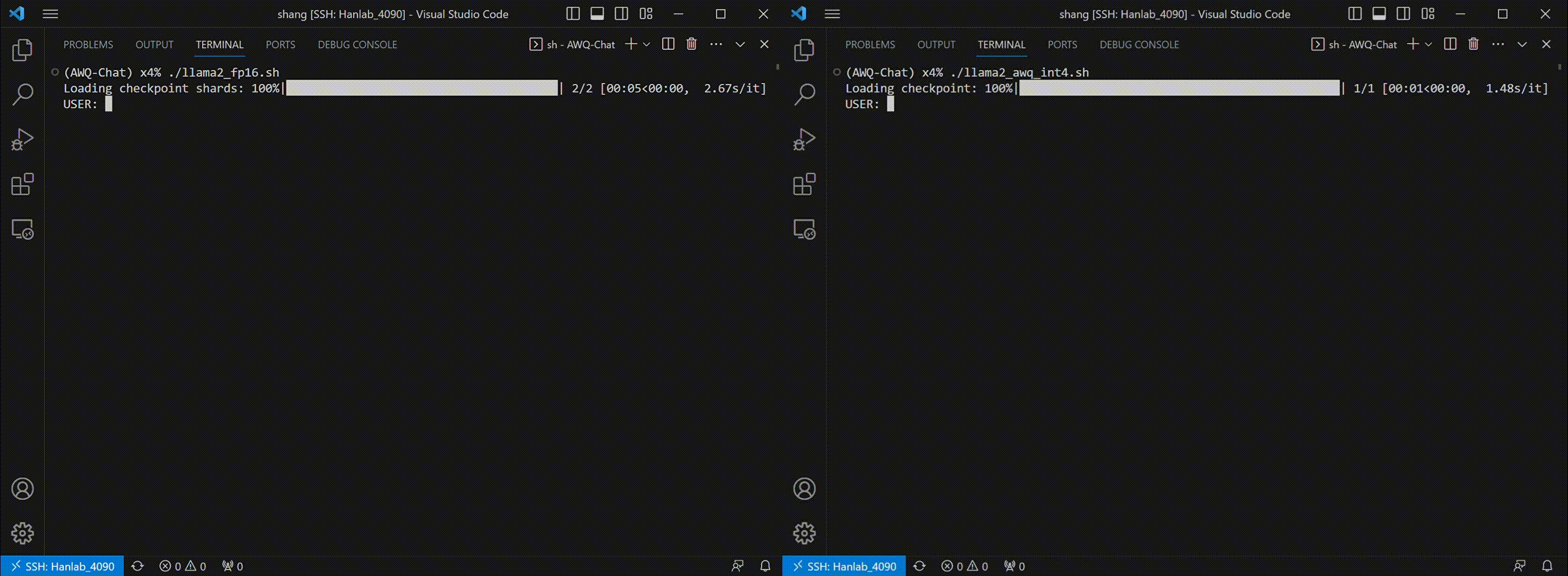AWQ: Activation-aware Weight Quantization for LLM Compression and Acceleration [Paper]
Efficient and accurate low-bit weight quantization (INT3/4) for LLMs, supporting instruction-tuned models and multi-modal LMs.
The current release supports:
- AWQ search for accurate quantization.
- Pre-computed AWQ model zoo for LLMs (LLaMA-1&2, OPT, Vicuna, LLaVA; load to generate quantized weights).
- Memory-efficient 4-bit Linear in PyTorch.
- Efficient CUDA kernel implementation for fast inference (support context and decoding stage).
- Examples on 4-bit inference of an instruction-tuned model (Vicuna) and multi-modal LM (LLaVA).
Check out TinyChat, which delievers 2.3x faster inference performance for the LLaMA-2 chatbot on RTX 4090!
It also offers a turn-key solution for on-device inferecne of LLMs on resource-constrained edge platforms. With TinyChat, it is now possible to run large models on small and low-power devices even without Internet connection.
- [2023/07] 🔥 We released TinyChat, an efficient and lightweight chatbot interface based on AWQ. TinyChat enables efficient LLM inference on both cloud and edge GPUs. LLama-2-chat models are supported! Check out our implementation here.
- [2023/07] 🔥 We added AWQ support and pre-computed search results for Llama-2 models (7B & 13B). Checkout our model zoo here!
- [2023/07] We extended the support for more LLM models including MPT, Falcon, and BLOOM.
- Clone this repository and navigate to AWQ folder
git clone https://github.com/mit-han-lab/llm-awq
cd llm-awq
- Install Package
conda create -n awq python=3.10 -y
conda activate awq
pip install --upgrade pip # enable PEP 660 support
pip install -e .
-
For edge devices like Orin, before running the commands above, please:
- Modify pyproject.toml by commenting out this line.
- Manually install precompiled PyTorch binaries (>=2.0.0) from NVIDIA.
- Set the appropriate Python version for conda environment (e.g.,
conda create -n awq python=3.8 -yfor JetPack 5).
- Install efficient W4A16 (4-bit weight, 16-bit activation) CUDA kernel and optimized FP16 kernels (e.g. layernorm, positional encodings).
cd awq/kernels
python setup.py install
We provide pre-computed AWQ search results for multiple model families, including LLaMA, OPT, Vicuna, and LLaVA. To get the pre-computed AWQ search results, run:
# git lfs install # install git lfs if not already
git clone https://huggingface.co/datasets/mit-han-lab/awq-model-zoo awq_cacheThe detailed support list:
| Models | Sizes | INT4-g128 | INT3-g128 |
|---|---|---|---|
| LLaMA-2 | 7B/7B-chat/13B/13B-chat | ✅ | ✅ |
| LLaMA | 7B/13B/30B/65B | ✅ | ✅ |
| OPT | 125m/1.3B/2.7B/6.7B/13B/30B | ✅ | ✅ |
| Vicuna-v1.1 | 7B/13B | ✅ | |
| LLaVA-v0 | 13B | ✅ |
AWQ can be easily applied to various LMs thanks to its good generalization, including instruction-tuned models and multi-modal LMs. It provides an easy-to-use tool to reduce the serving cost of LLMs.
Here we provide two examples of AWQ application: Vicuna-7B (chatbot) and LLaVA-13B (visual reasoning) under ./examples directory. AWQ can easily reduce the GPU memory of model serving and speed up token generation. It provides accurate quantization, providing reasoning outputs. You should be able to observe memory savings when running the models with 4-bit weights.
Note that we perform AWQ using only textual calibration data, depsite we are running on multi-modal input. Please refer to ./examples for details.
We provide several sample script to run AWQ (please refer to ./scripts). We use OPT-6.7B as an example.
- Perform AWQ search and save search results (we already did it for you):
python -m awq.entry --model_path /PATH/TO/OPT/opt-6.7b \
--w_bit 4 --q_group_size 128 \
--run_awq --dump_awq awq_cache/opt-6.7b-w4-g128.pt- Evaluate the AWQ quantized model on WikiText-2 (simulated pseudo quantization)
python -m awq.entry --model_path /PATH/TO/OPT/opt-6.7b \
--tasks wikitext \
--w_bit 4 --q_group_size 128 \
--load_awq awq_cache/opt-6.7b-w4-g128.pt \
--q_backend fake- Generate real quantized weights (INT4)
mkdir quant_cache
python -m awq.entry --model_path /PATH/TO/OPT/opt-6.7b \
--w_bit 4 --q_group_size 128 \
--load_awq awq_cache/opt-6.7b-w4-g128.pt \
--q_backend real --dump_quant quant_cache/opt-6.7b-w4-g128-awq.pt- Load and evaluate the real quantized model (now you can see smaller gpu memory usage)
python -m awq.entry --model_path /PATH/TO/OPT/opt-6.7b \
--tasks wikitext \
--w_bit 4 --q_group_size 128 \
--load_quant quant_cache/opt-6.7b-w4-g128-awq.ptIf you find AWQ useful or relevant to your research, please kindly cite our paper:
@article{lin2023awq,
title={AWQ: Activation-aware Weight Quantization for LLM Compression and Acceleration},
author={Lin, Ji and Tang, Jiaming and Tang, Haotian and Yang, Shang and Dang, Xingyu and Han, Song},
journal={arXiv},
year={2023}
}
SmoothQuant: Accurate and Efficient Post-Training Quantization for Large Language Models
GPTQ: Accurate Post-training Compression for Generative Pretrained Transformers


